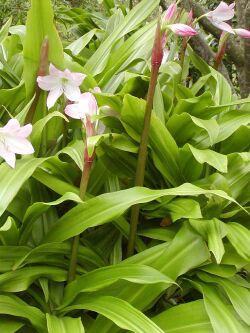Biology:Crininae
| Crininae | |
|---|---|

| |
| Crinum moorei | |
| Scientific classification | |
| Kingdom: | Plantae |
| Clade: | Tracheophytes |
| Clade: | Angiosperms |
| Clade: | Monocots |
| Order: | Asparagales |
| Family: | Amaryllidaceae |
| Subfamily: | Amaryllidoideae |
| Tribe: | Amaryllideae |
| Subtribe: | Crininae Baker[1][2] |
| Type genus | |
| Crinum | |
| Genera | |
|
See text | |
| Synonyms | |
|
Crineae | |
Crininae is one of four subtribes within the tribe Amaryllideae (subfamily Amaryllidoideae, family Amaryllidaceae), with a pantropical distribution (Crinum) and also sub-Saharan Africa.[3][4]
Description
Leaves frequently show an intercalary meristem and are usually fringed with cartilaginous teeth. The leaf apices are also often truncate (cut off). The flowers may be actinomorphic to zygomorphic, with a perigone tube with free stamens. The fruit is indehiscent, irregular, and often rostellate (rosetted). The scape does not abscise (shed) during seed dispersal, with the exception of Ammocharis longifolia where it detaches at ground level. The seeds also lack an integument, but are endosperm-rich and partially chlorophyllous with cork-covering.
Taxonomy
Phylogeny
Crininae are phylogenetically placed within the Amaryllideae as follows:
| Tribe Amaryllideae |
| ||||||||||||||||||
Subdivision
As circumscribed by Meerow et al. (2001), there were three genera (Species), although the precise relationship between Cybistetes and Amocharis has been problematic, having been segregated in 1939[5] but later restored in 2007,[6] submerging Cybistetes within Ammocharis as A. longifolia:[7]
Genera (species):
- Crinum (65)
- Ammocharis (6)
Distribution
The subtribe is widespread in the tropics (pantropical) and sub-Saharan Africa.
References
- ↑ J. Bot. 16: 164. ante 11 Jun 1878; Pax in Engler & Prantl, Nat. Pflanzenfam.2, 5. 108. 1887
- ↑ Müller-Doblies & Müller-Doblies 1996.
- ↑ Meerow & Snijman 2001.
- ↑ Vigneron 2008.
- ↑ Milne-Redhead & Schweickerdt 1939.
- ↑ Kwembeya et al 2007.
- ↑ Snijman & Kolberg 2011.
Bibliography
- Milne-Redhead, E.; Schweickerdt, H. G. (October 1939). "A new conception of the genus Ammocharis Herb.". Journal of the Linnean Society of London, Botany 52 (342): 159–197. doi:10.1111/j.1095-8339.1939.tb01601.x.
- Meerow, Alan W.; Lehmiller, David J.; Clayton, Jason R. (March 2003). "Phylogeny and biogeography of Crinum L. (Amaryllidaceae) inferred from nuclear and limited plastid non-coding DNA sequences". Botanical Journal of the Linnean Society 141 (3): 349–363. doi:10.1046/j.1095-8339.2003.00142.x. http://naldc.nal.usda.gov/download/3257/PDF. Retrieved 2016-02-27.
- Kwembeya, Ezekeil G.; Bjorå, Charlotte S.; Stedje, Brita; Nordal, Inger (1 August 2007). "Phylogenetic Relationships in the Genus Crinum (Amaryllidaceae) with Emphasis on Tropical African Species: Evidence from trnL-F and Nuclear ITS DNA Sequence Data". Taxon 56 (3): 801. doi:10.2307/25065863.
- Müller-Doblies, U.; Müller-Doblies, D. (1996). "Tribes and subtribes and some species combinations in Amaryllidaceae J St Hil R Dahlgren & al. 1985". Feddes Repertorium 107 (5–6): S.c.1–S.c.9.
- Meerow, Alan W.; Snijman, Deirdre A. (December 2001). "Phylogeny of Amaryllidaceae Tribe Amaryllideae Based on nrDNA ITS Sequences and Morphology". American Journal of Botany 88 (12): 2321–2330. doi:10.2307/3558392. PMID 21669663. https://naldc-legacy.nal.usda.gov/naldc/download.xhtml?id=3004&content=PDF. Retrieved 2018-12-29.
- Snijman, D. A.; Linder, H. P. (1996). "Phylogenetic Relationships, Seed Characters, and Dispersal System Evolution in Amaryllideae (Amaryllidaceae)". Annals of the Missouri Botanical Garden 83 (3): 362–386. doi:10.2307/2399866. https://www.biodiversitylibrary.org/part/7767.
- Vigneron, Pascal (2008). "Amaryllidaceae" (in French). http://www.amaryllidaceae.org//index.htm.
- "Amaryllidaceae: A taxonomic tool for the Amaryllidaceae of the world". eMonocot. http://amaryllidaceae.e-monocot.org/.
- Katja Weiehhardt-Kulessa, Thomas Bórner, Jiirgen Sehmitz, Ute Müller-Doblies, and Dietrich Müller-Doblies. 2000. Controversial taxonomy of Strumariinae (Amaryllidaceae) investigated by nuclear rDNA (ITS) sequences. 1. Hessea, Namaquanula, Kamiesbergia, and Dewinterella. Plant Syst. Evol. 223:1-13 (2000)[yes|permanent dead link|dead link}}]
- Germishuizen, G.; Meyer, N.L., eds (2003). "Plants of Southern Africa: an annotated checklist". Strelitzia 14 (i-vi): 1–1231. http://planet.botany.uwc.ac.za/NISL/Biodiversity/Attachments/Plants%20of%20SA.pdf. (online version)
- Snijman, D. A.; Kolberg, H. (2011). "Ammocharis deserticola (Amaryllideae), a new species from Namibia and a key to species of the genus". Bothalia 41 (2): 308–311. doi:10.4102/abc.v41i2.69. http://herbaria.plants.ox.ac.uk/bol/Content/Projects/namibia/Resources/Snijman_and_Kolberg2011_ammocharis.pdf. Retrieved 2016-02-28.
External links
| Wikimedia Commons has media related to Crininae. |
Wikidata ☰ Q10864157 entry
 |
